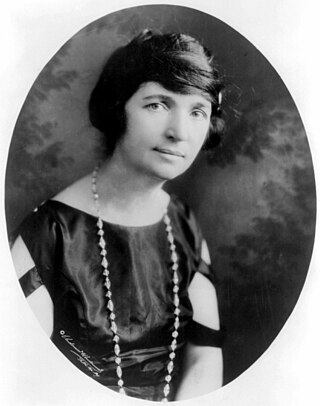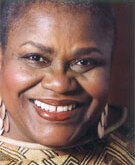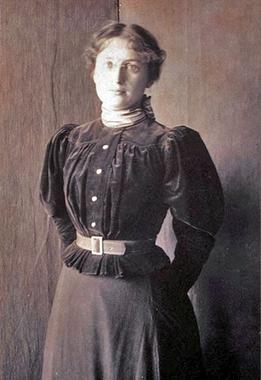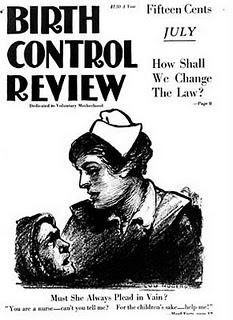
Margaret Higgins Sanger, also known as Margaret Sanger Slee, was an American birth control activist, sex educator, writer, and nurse. Sanger popularized the term "birth control", opened the first birth control clinic in the United States, and established organizations that evolved into the Planned Parenthood Federation of America.

Jeannette Pickering Rankin was an American politician and women's rights advocate who became the first woman to hold federal office in the United States in 1917. She was elected to the U.S. House of Representatives as a Republican from Montana in 1916; she served one term until she was elected again in 1940. As of 2023, Rankin is still the only woman ever elected to Congress from Montana.

Bernice Johnson Reagon is a song leader, composer, scholar, and social activist, who in the early 1960s was a founding member of the Student Non-violent Coordinating Committee's (SNCC) Freedom Singers in the Albany Movement in Georgia. In 1973, she founded the all-black female a cappella ensemble Sweet Honey in the Rock, based in Washington, D.C. Reagon, along with other members of the SNCC Freedom Singers, realized the power of collective singing to unify the disparate groups who began to work together in the 1964 Freedom Summer protests in the South.
"After a song", Reagon recalled, "the differences between us were not so great. Somehow, making a song required an expression of that which was common to us all.... This music was like an instrument, like holding a tool in your hand."

Katharine Dexter McCormick was a U.S. suffragist, philanthropist and, after her husband's death, heir to a substantial part of the McCormick family fortune. She funded most of the research necessary to develop the first birth control pill.

The Silent Sentinels, also known as the Sentinels of Liberty, were a group of over 2,000 women in favor of women's suffrage organized by Alice Paul and the National Woman's Party, who protested in front of the White House during Woodrow Wilson's presidency starting on January 10, 1917. Nearly 500 were arrested, and 168 served jail time. They were the first group to picket the White House. Later, they also protested in Lafayette Square, not stopping until June 4, 1919 when the Nineteenth Amendment to the United States Constitution was passed both by the House of Representatives and the Senate.

Mary Coffin Ware Dennett was an American women's rights activist, pacifist, homeopathic advocate, and pioneer in the areas of birth control, sex education, and women's suffrage. She co-founded the National Birth Control League in 1915 together with Jessie Ashley and Clara Gruening Stillman. She founded the Voluntary Parenthood League, served in the National American Women's Suffrage Association, co-founded the Twilight Sleep Association, and wrote a famous pamphlet on sex education and birth control. A famous legal case against her eventually became the catalyst for overturning the Comstock laws.
The American Birth Control League (ABCL) was founded by Margaret Sanger in 1921 at the First American Birth Control Conference in New York City. The organization promoted the founding of birth control clinics and encouraged women to control their own fertility. In 1942, the league became the Planned Parenthood Federation of America.

Dolores Clara Fernández Huerta is an American labor leader and civil rights activist who, with Cesar Chavez, is a co-founder of the National Farmworkers Association, which later merged with the Agricultural Workers Organizing Committee to become the United Farm Workers (UFW). Huerta helped organize the Delano grape strike in 1965 in California and was the lead negotiator in the workers' contract that was created after the strike.
The first ever World Population Conference was held at the Salle Centrale, Geneva, Switzerland, from 29 August to 3 September 1927. Organized by the forerunner of the United Nations, the League of Nations, and Margaret Sanger; the conference was an attempt to bring together international experts on population, food supply, fertility, migration and health to discuss the problem of human overpopulation. The conference was organized with funds donated by Sanger's husband, J. Noah Slee, as well as a grant from the Rockefeller Foundation. Sir. Bernard Mallet presided over the meeting, and William H. Welch was vice-president.

Maafa 21: Black Genocide in 21st Century America is an anti-abortion documentary film produced by anti-abortion activist Mark Crutcher in 2009. The film, which has been enthusiastically received by anti-abortion activists, argues that the modern-day prevalence of abortion among African Americans is rooted in an attempted genocide or the maafa of black people. The film is part of an anti-abortion, anti-birth control campaign aimed at African Americans.

Katharine Martha Houghton Hepburn was an American feminist social reformer and a leader of the suffrage movement in the United States. Hepburn served as president of the Connecticut Woman Suffrage Association before joining the National Woman's Party. Alongside Margaret Sanger, Hepburn co-founded the organization that would become Planned Parenthood. She was the mother and namesake of actress Katharine Hepburn and the grandmother and namesake of actress Katharine Houghton.

The birth control movement in the United States was a social reform campaign beginning in 1914 that aimed to increase the availability of contraception in the U.S. through education and legalization. The movement began in 1914 when a group of political radicals in New York City, led by Emma Goldman, Mary Dennett, and Margaret Sanger, became concerned about the hardships that childbirth and self-induced abortions brought to low-income women. Since contraception was considered to be obscene at the time, the activists targeted the Comstock laws, which prohibited distribution of any "obscene, lewd, and/or lascivious" materials through the mail. Hoping to provoke a favorable legal decision, Sanger deliberately broke the law by distributing The Woman Rebel, a newsletter containing a discussion of contraception. In 1916, Sanger opened the first birth control clinic in the United States, but the clinic was immediately shut down by police, and Sanger was sentenced to 30 days in jail.

Kitty Marion 12 March 1871 – 9 October 1944) was born Katherina Maria Schäfer in Germany. She emigrated to London in 1886 when she was fifteen, and she grew to minor prominence when she sang in music halls throughout the United Kingdom during the late 19th century. She became known in the field for standing up for female performers against agents, corruption, and for better working conditions. She joined the Women's Social and Political Union (WSPU) in 1908, engaged in selling their newspaper Votes for Women and became a prominent suffragette in the United Kingdom for her participation in civil unrest protests including riots and arson. As a result, Marion was arrested many times and is known for having endured 232 force-feedings while on hunger strike in prison. She is quoted as saying “there are no words to describe the horrible revolting sensation.” When World War I started she emigrated to the United States, and there she joined the team on Margaret Sanger’s Birth Control Review. Although she used her tenacity and loud voice to get people to pay attention to her cause, she did not use violence as much as she had in the United Kingdom, although she was still arrested many times for advocating birth control.

Birth Control Review was a lay magazine established and edited by Margaret Sanger in 1917, three years after her friend, Otto Bobsein, coined the term "birth control" to describe voluntary motherhood or the ability of a woman to space children "in keeping with a family's financial and health resources." Sanger published the first issue while imprisoned with Ethel Byrne, her sister, and Fannie Mindell for giving contraceptives and instruction to poor women at the Brownsville Clinic in New York. Sanger remained editor-in-chief until 1928, when she turned it over to the American Birth Control League. The last issue was published in January 1940.
Dorothy Hamilton Brush was a birth control advocate, women's rights advocate and author. She worked with Margaret Sanger and the birth control movement and wrote plays, travel articles, and books

George Rublee (1868–1957) was a U.S. lawyer who involved himself with state and national political reform during the Progressive Era (1910-1918) and with international affairs from 1917 to 1945.

Caroline Lexow Babcock was an American pacifist and suffragist, co-founder of the Women's Peace Union, and Executive Secretary of the National Women's Party from 1938 to 1946.
Family Limitation is a pamphlet written by American family planning activist, eugenicist, educator, writer, and nurse Margaret Sanger that was published in 1914. It was one of the first guides to birth control published in the United States. The 16-page pamphlet details information on, and ingredients for, various contraceptive methods and included illustrations and instructions for use. After the pamphlet was released, Sanger was forced to flee the United States to Britain to avoid prosecution under federal anti-obscenity laws, the Comstock Act, which prohibited disseminating information about contraception.
Edna Lamprey Stantial (1897-1985) was an American suffragist and archivist.
Florence Rose was an American birth control activist, perhaps best known for serving as the secretary of Margaret Sanger for more than a decade.
















